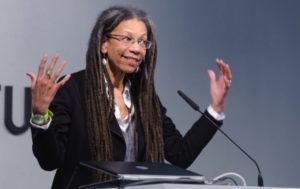
Ruth Wilson Gilmore, well known scholar and activist, will present “Too Soon for Sorry: Abolition Geography and the Problem of Innocence,” the Wallace W. Atwood Lecture presented by the Graduate School of Geography at Clark University. The lecture is free and open to the public and will begin at 7 p.m. Thursday, March 19, in Tilton Hall, Higgins University Center.
Gilmore is a Professor of Earth and Environmental Sciences and American Studies at the City University of New York. She is director of The Center for Place, Culture, and Politics and is the 2014 recipient of the Harold M. Rose Award for Anti-Racism Research and Practice, awarded by the Association of American Geographers. She serves on the Executive Committee at the Institute for Research on the African Diaspora in the Americas and The Caribbean (IRADAC).
This year’s Atwood Lecture will be carried by livestream at the link here.
Gilmore’s book “Golden Gulag: Prisons, Surplus, Crisis, and Opposition in Globalizing California” provides the first detailed explanation for “the biggest prison building project in the history of the world” by looking at how political and economic forces, both globally and locally, conjoined to produce the prison boom. In 2008, Gilmore was awarded the Lora Romero First Book Publication Prize for this book by the American Studies Association.
In 2012, the American Studies Association awarded Gilmore the Angela Y. Davis prize for Public Scholarship, which “recognizes scholars who have applied or used their scholarship for the ‘public good.’ This includes work that explicitly aims to educate the public, influence policies, or in other ways seeks to address inequalities in imaginative, practical, and applicable forms.”
The annual Atwood Lecture Series honors Wallace W. Atwood, founder of the Graduate School of Geography and the President of Clark University from 1921 to 1946.
Founded in 1887 in Worcester, Massachusetts, Clark University is a liberal arts-based research university addressing social and human imperatives on a global scale. Nationally renowned as a college that changes lives, Clark is emerging as a transformative force in higher education today. LEEP (Liberal Education and Effective Practice) is Clark’s pioneering model of education that combines a robust liberal arts curriculum with life-changing world and workplace experiences. Clark’s faculty and students work across boundaries to develop solutions to complex challenges in the natural sciences, psychology, geography, management, urban education, Holocaust and genocide studies, environmental studies, and international development and social change. The Clark educational experience embodies the University’s motto: Challenge convention. Change our world.


